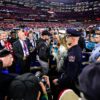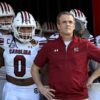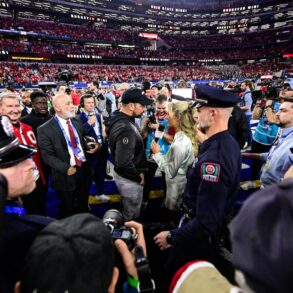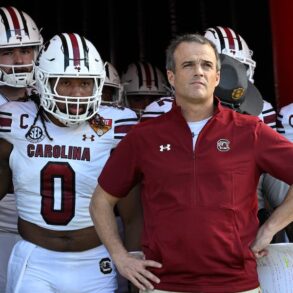On the day before college football’s national championship game, I went to a stakeout. On the third floor of an Atlanta hotel, reporters had gathered outside a meeting room. Inside the room were college football’s power brokers—the suits.
The reporters’ mission was to loiter outside the meeting room for a few hours in case a suit emerged to reveal news about changes to the playoff. No reporter thought that would happen. At one point, SEC commissioner Greg Sankey walked up to a desk separating the press from the roomful of newsmakers and said, “That’s a red line.” (He was kidding but not kidding.) During lunch, reporters watched the university presidents of Tulane, Buffalo, and Western Kentucky zip through the halls.
“The fact that we can identify college presidents without names on the back of their jerseys indicates how much our jobs have changed,” said ESPN’s Heather Dinich, who was one of the reporters standing watch.
Outside the window, you could see Mercedes-Benz Stadium, where Ohio State and Notre Dame will play Monday in the final of the newly expanded 12-team playoff. The reporters had plenty of takes about the game. But a huge amount of their time is spent chronicling the administrative dealing—you could optimistically call it intrigue—that takes place in meeting rooms like this one. The suit has become the college football reporter’s go-to interview subject, and the hotel stakeout is an essential part of the beat.
Spend a few minutes with a college reporter on the eve of the natty and you learn things. They feel the season, by their standards, has been very long. “The season feels like it lasted two years,” said The Athletic’s Stewart Mandel, when I ran into him at the media hotel in downtown
Atlanta. Last year’s final was only 12 days earlier than this one, but the expanded playoff started five days before Christmas.
On the credit side, reporters feel the season was really good, maybe the best in recent memory. There were top-5 matchups like Oregon–Ohio State and Georgia-Texas. Those who embrace the Spencer Hall aesthetic of covering the sport from bottom to top found the supersized playoff meant there were meaningful, late-season stories to write about the likes of Arizona State and Army.
But there are also issues piling up. In the past few days, Joe Biden’s departments of Justice and Education issued edicts about college football. Wisconsin and the Big Ten reprimanded Miami after a player skipped out on an NIL deal with the Badgers to join the Hurricanes. “You cover sports,” said NBC’s Nicole Auerbach. “It’s usually lighter than the news. This actually feels like you’re covering a period of time when it’s transforming daily.”
Twenty years ago, ESPN’s Pete Thamel told me, a tiny handful of print reporters could be found lurking outside suit-infested meetings. On Sunday, reporters were swapping war stories about previous stakeouts. Remember the tense one in 2022 in Indianapolis, on the day of the title game? Remember those days—and days—wasting away at Dallas Fort-Worth Airport’s Grand Hyatt?
Covering a college-football conclave is not like covering a Meta board meeting. “There’s not a Roger Goodell in that room,” said Dinich. The group in Atlanta—comprised of conference commissioners, university presidents, and chancellors—had to get unanimous consent to pass any change to the playoff. They found no consensus on Sunday.
In 2025, what’s mind-bending about covering college football is how many big-ticket items are lying on the table. On the modest end: Should the playoff expand to 14 or 16 teams? More ambitiously: Will college football morph into a super league that collectively bargains with a players union?
These stories are a long way from asking how Notre Dame’s secondary will stop Ohio State wide receiver Jeremiah Smith. Even if conference realignment stories do big traffic, there’s a danger in going full-suit.
“The wonky stuff, the policy stuff—you have to understand it,” said The Athletic’s Ralph Russo, who was at the stakeout. “You have to know who to talk to about it. But you got to be careful how much you write about it. Because to a certain degree, your readers are like, How does this affect my running back room?”
“Back in the old days,” said Dinich, “we’re talking to coaches and players more than anyone else. Telling players’ stories. And we still do that. I still do that. But so much of the story line has been off of the field, and the coaches have no say in it.”
Indeed, one of the forces that changed the beat is the shrinking power of the college football coach. Reporters say this started during COVID, when coaches had little say—and practically no knowledge—about when their teams would play and under what conditions.
Over the next five years, coach power shrinkage continued apace, even as the biggest names can still make $10 million a year. Coaches don’t control realignment or the playoff. Players switching teams through the transfer portal diminished the perceived power that coaches had over their own rosters.
College football writers used to be measured, at least to a degree, on how many coaches’ numbers they had in their phones. “The biggest change as a reporter,” said The Athletic’s Chris Vannini, “is the power of knowing coaches versus, now, the power of knowing suits.”
On Saturday, I met ESPN’s Rece Davis in a room near the network’s production office. Davis wore a blue plaid blazer with a pocket square. Last summer, I happened to run into Davis at an airport. Though his hair was perfectly coiffed, he was wearing civilian clothes, and the encounter had a startling, I-saw-my-teacher-at-the-supermarket effect on me. The pocket square was reassuring.
As host of GameDay, Davis is the thoughtful emcee of college football. Now, podcast microphone in hand, he was reflecting on the state of the sport and its relationship with ESPN. More than a decade ago, an LSU chancellor imagined the sport would consist of two conferences: “one called ESPN and one called Fox.”
This year, that just about happened. ESPN took full possession of the SEC schedule. Games from the Big Ten, the other mega-conference, were split between Fox, NBC, and CBS.
It took one playoff game for ESPN to get slapped with charges of favoritism. Notre Dame dominated Indiana, a Big Ten team. On the broadcast, ESPN’s Sean McDonough called the game a “little bit of a dud” and said it would lead to talk about the Hoosiers’ playoff-worthiness.
I asked McDonough about those comments in Atlanta. “I felt bad that it became kind of skewed that I said they don’t belong,” he said. “Because I didn’t say that. I do believe they belonged.”
“What I said was, because they didn’t play well and the game was so one-sided, that I do think it was going to spur on debate. Which maybe I started.”
The real debate began the next morning on GameDay. Kirk Herbstreit said the Hoosiers were “not a team that should have been on that field when you consider other teams that could have been there.” Not long after, Joel Klatt, who is Herbie’s announcer-equivalent on Fox, tweeted about “partisan BS” seeping into college football discourse without mentioning his target.
Davis defended Herbstreit’s harangue. “Kirk was just saying what he thought,” he said. “He certainly wasn’t wrong about what happened on the field.”
As to the charges of ESPN’s conference favoritism, Davis made two points. This year, GameDay made its typical rounds to the sites of games shown on other networks: Oregon–Ohio State Part 1 (NBC), Ohio State–Penn State (Fox), even Washington-Indiana (Big Ten Network).
Davis’s second point was that ESPN owns the entire 12-team playoff. If the network wasn’t doing business with the Big Ten, he said, “once we get to the playoff, they’re all our teams.”
The other charge made about ESPN is that, as the playoff’s sole TV partner, it has enormous influence over any tweaks to the formula. On the Dec. 8 selection show, Davis said the committee should dump the automatic byes for conference champs (see Boise State and Arizona State).
Was that you lobbying the committee on TV? I asked Davis.
“A little bit, yes,” he said. But he noted he was lobbying for procedural change, not for which team should make the playoff.
I don’t think ESPN’s entanglements should cause announcers to stifle their opinions. Nor that a sport built around arguments should turn them off for the postseason. I do think it would be helpful, a few times a year, for someone on GameDay to say, “As a reminder, our bosses made a 10-year, $3 billion deal with the SEC. They didn’t make a deal with the Big Ten.”
Davis said such a disclosure was unlikely to pacify ESPN’s critics. “I don’t really care about the wars between the TV networks,” said The Athletic’s Sam Khan Jr., who previously worked at ESPN. “I just don’t want them messing with the product.”
At the hotel stakeout, I met Pete Nakos, an On3 reporter who had the biggest college football scoop of the postseason. On New Year’s Eve, Nakos reported that an unnamed team had offered Texas quarterback Quinn Ewers $6 million to skip the NFL draft and play one more year of college football.
Ewers’s Longhorns had a playoff game the next day. But the story directed readers’ eyes away from the action on the field and toward a hypothetical free-agent scenario. Sports fans will recognize this kind of story. It was an NBA scoop.
College football has always had transaction stories. Going back to the days of 900 numbers and beyond, there have been recruiting scoops. There are coaching-search stories—the Pete Thamel Woj bomb.
Remarkably, there’s now a third category of scoopery. “The Pete Nakos Woj bomb,” said On3’s Andy Staples.
Just about every big media outlet has a transfer-portal insider. If some didn’t make it to Atlanta, well, that just shows where the action is. ESPN has Max Olson. On3 has Nakos and Hayes Fawcett. Chris Hummer and Matt Zenitz are on the beat for CBS/247. In December, a team of Athletic reporters pitched in when the portal opened, to use the preferred sci-fi verb.
Portal scoops have a certain irresistibility. “It’s not like the NFL, where at the end of the season everyone knows whose contracts are expiring,” said Olson. In college football, anyone can become a free agent. Olson said it would be like Jayden Daniels—himself a college portal-er —finishing up his season with the Commanders and then announcing he wanted to find a new team that could get him to the Super Bowl.
Part of what powers NBA scoop culture is the idea that teams and players are plotting future moves in secret. On3 pushed its Ewers scoop with a graphic that said “TAMPER.” (Later, Ewers announced he would enter the NFL draft.)
In college football, tampering is at least quasi-legal. “Nobody has to tamper anymore because these guys all have agents,” said Olson. “The agent can reach out to a school and say, ‘Hey, what would you offer if this guy went in the transfer portal?’”
Olson continued: “I’ve heard from GMs in November who said, ‘This agent sent me this list of guys he represents and what the price would be.’ Everybody’s kind of on the block.” There is no official reporting of payouts, so numbers are hard to pin down. Olson said a couple of players will make $3 million to $4 million next year.
The portal scoop has changed the college football beat beyond adding more process stories. In April, the portal will reopen around the time teams complete their spring practices. When combined with lawsuits and other meeting-room intrigues, that has extended the “season” just like insiderdom did with the NBA. The old professional twofer of covering college football and college basketball is getting increasingly tricky.
“Instead of being a nine- or 10-month sport, it has really turned into a 12-month, year-round sport,” said Khan. When Dinich goes to Myrtle Beach, South Carolina, in the summer, she packs an hIFB for SportsCenter hits along with her kids’ sand toys.
None of the reporters on hotel stakeout duty minded too much. The most exciting time for a journalist comes when their subjects are staring down a moment of historic change. If you date back to the end of amateurism as we know it, college football writers are in triple overtime.
While Dinich was waiting for the suits in Atlanta, I asked whether this part of the job was fun. “As a college football reporter who genuinely likes college football,” she said, “to be able to report on the fact that the postseason has now gone to places it has never been before, and to document that, that means a lot to me.”
“Is it fun?” she said. “No. But it’s a privilege.”
Bryan Curtis
Bryan Curtis is the editor-at-large of The Ringer and cohost of ‘The Press Box’ podcast. A native of Fort Worth, Texas, he’s written for The New Republic, Slate, Play, and Grantland. He plays a deejay in a movie about the end of the world.This post was originally published on this site be sure to check out more of their content.








